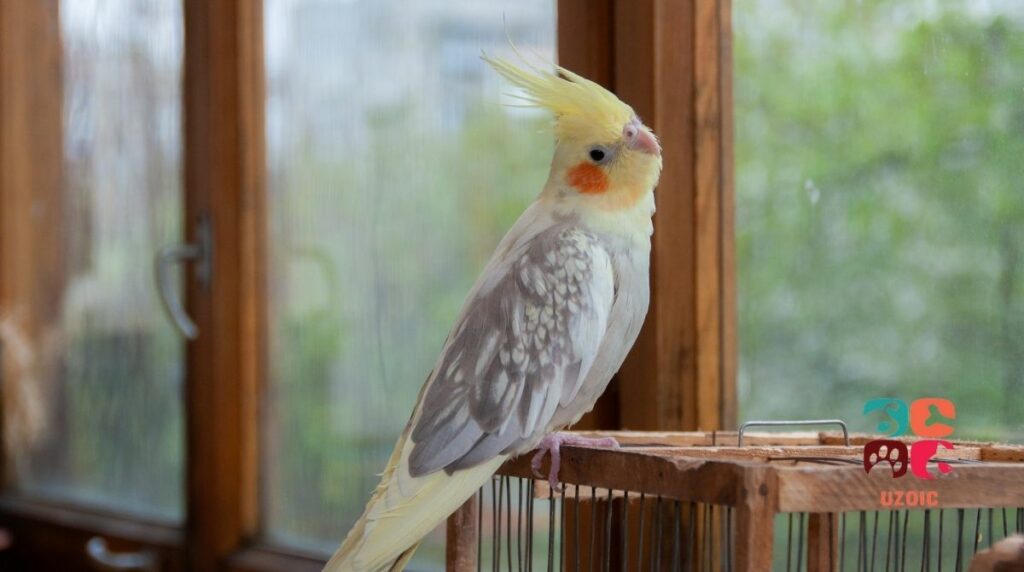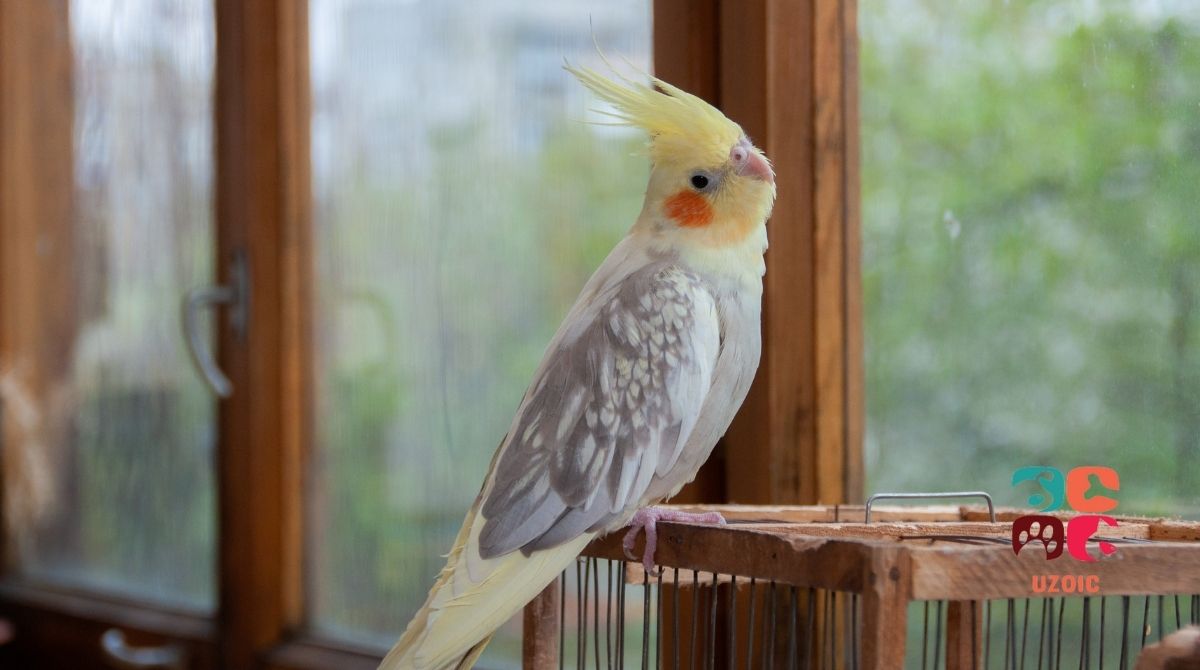If your Cockatiel’s poop smells terrible, there’s a good chance that they have a stomach infection. This can be caused by several things, including bacteria, parasites, or viruses. If left untreated, a stomach infection can make your cockatiel very sick. In this blog post, we will discuss the symptoms of a Cockatiel with a stomach infection and how you can treat it.
Cockatiels are susceptible to several different types of infections, including bacterial, fungal, viral, and parasitic infections.
Table of Contents
Why Does My Cockatiel’s Poop Smells Terrible?

Your cockatiel may have picked up an infection. Have the poop cultured by a vet to identify the pathogen. You can treat a bacterial infection with antibiotics prescribed by your vet. A fungal or viral infection will require a different course of treatment. Cockatiels are also susceptible to parasites, such as mites, lice, and worms. If your Cockatiel has a parasite infestation, your vet can prescribe the appropriate medication to get rid of the parasites.
Is Cockatiel’s Poop Supposed To Smell Bad?
No, a cockatiel’s poop should not smell bad. It should be odorless. Foul smelling poop indicates an underlying stomach issue that needs to be checked by an avian vet.
If your Cockatiel has a stomach infection, they may show one or more of the following symptoms:
- Diarrhea / Watery Poop
- Smelly Poop
- Loss of appetite
- Weight loss
- Lethargy
If you notice any of these symptoms in your Cockatiel, make an appointment with your avian vet right away. Early diagnosis and treatment is important to preventing a serious illness. Your vet will likely recommend a course of antibiotics to clear up the infection. In some cases, hospitalization may be necessary.
What Does It Mean If My Cockatiel’s Poop Smells Terrible?
Foul-smelling poop in a Cockatiel indicates a bacterial or fungal infection. It means that something is wrong with your bird’s tummy. The top culprit is E. Coli or Yeast. Your vet will be able to do a culture to identify the pathogen and prescribe antibiotics if necessary.
Cockatiel may also have parasites. If you notice any changes in your Cockatiel’s poop, make an appointment with your avian vet. Early diagnosis and treatment is important to prevent a serious illness.
What Color Should A Healthy Cockatiel’s Poop Be?
Healthy cockatiel droppings will be brown/dark green and white, with the white part being urates and the brown part being feces. It should be odorless.
While it may not be the most pleasant subject, understanding your cockatiel’s droppings can give you valuable insight into their health. There are three main types of cockatiel droppings: fecal matter, urine, and urate. Fecal matter is the solid waste that is excreted through the cloaca, and it should be dark brown/ dark green in color, depending on the diet. The solid waste is made up of everything your bird eats that it can’t digest, such as shells and seed hulls. Urine is a clear or slightly yellow liquid that is produced by the kidneys, and it is typically mixed with fecal matter. Urate, on the other hand, is a white paste-like substance that is also produced by the kidneys. They should make up about 25% of your bird’s total dropping.
While all three types of droppings can vary in color and consistency based on their diet, they should generally be uniform from day to day. If you notice a sudden change in your cockatiel’s droppings, it could be a sign of illness, and you should take them to see a vet. For example, watery feces can indicate an infection, while blood in the droppings can signal internal bleeding. You can catch potential health problems early on and give your feathered friend the best chance for a full recovery by paying attention to your cockatiel’s droppings.
What Do The Different Types Of Cockatiel Droppings Mean?
There are various types of cockatiel droppings, each of which can tell us something about the health and well-being of our pet. For example, black or bright red blood in droppings is often a sign of bleeding from the digestive tract, intestinal infections, tumors, ingestion of a foreign object, parasites, or egg binding. On the other hand, bright lime green or yellow urates indicate chlamydiosis, or “parrot fever,” which can be transmitted to humans through contaminated droppings (Source: CDC). Additionally, bright red blood in droppings can indicate bleeding from the lower digestive tract, while heavy metal poisoning is indicated by red or reddish-brown droppings. Ultimately, we must pay close attention to the appearance of our cockatiel’s poop so that we can quickly identify and address any potential problems.
Quick identification checklist
- Runny, watery consistency: Cockatiel has diarrhea and needs to see a vet right away
- Foul smell: Cockatiel has a bacterial or fungal infection and needs to see a vet
- Different color than usual: Cockatiel may be eating something new that is causing the color change. If the color has changed to Black, Tarry, Only Brown, Red, take Cockatiel to the vet.
- Undigested food: Cockatiel may be eating too fast or not chewing their food properly. Try to slow down your Cockatiel’s eating habits by making mealtime more relaxed.
- Blood in Cockatiel poop: Cockatiel may have intestinal bleeding or infection.
As you can see, there are many different reasons why your Cockatiel’s poop might smell terrible. If you notice any changes, take Cockatiel to the vet for an evaluation.
How Do You Get Rid Of The Smell Of Cockatiel’s Poop?
If you suspect a bacterial infection, have your Cockatiel checked by an avian vet. They will perform a culture on the poop, which would usually come positive for E. Coli if it is an infection. Then, the vet may give an antibiotic such as Clavamox and a probiotic supplement such as AviCulture to clear up the infection. Helpful tip: take the poop along with you so that the doctor can perform the culture fast.
Conclusion
In conclusion, if your Cockatiel’s Poop Smells Terrible, it’s important to take your bird to the vet for diagnosis and treatment. A stomach infection can quickly become life-threatening if it’s not treated promptly. Your vet will likely give your Cockatiel a course of antibiotics to clear up the infection. You will also need to ensure that your Cockatiel is getting plenty of rest and fluids. A diet of soft foods may also be recommended. With prompt treatment, most Cockatiels make a full recovery.
Thanks for reading! We hope that this blog post has been helpful. Have a great day!
You may like:
- Why Do Budgies Sleep in Strange Positions?
- Do Budgies Like Music? The Effects of Music on Budgie Behavior
- Can You Keep A Seagull As A Pet?


